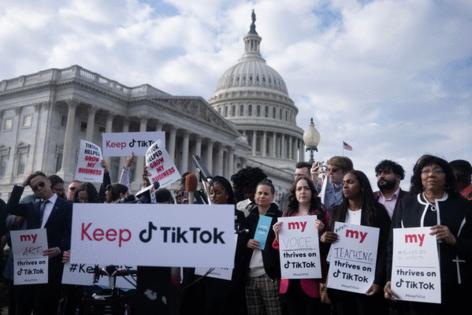TikTok, Tesla are just the start of US-China clash over Big Data
Published in News & Features
The U.S. push to ban TikTok marks a new phase in its approach to data security that could eventually impact everything from electric vehicles to health care, reshaping trade relations between the world’s biggest economies.
President Joe Biden last week signed legislation barring Chinese parent ByteDance Ltd’s ownership of TikTok, a move aimed at preventing Beijing from accessing troves of data that the video sharing app collects from its 170 million American users. The law takes a page out of China’s playbook, viewing the potential misuse of data as a national security threat.
Although Beijing has long adopted far more restrictions on U.S. companies in China, authorities have embraced firms that play by its rules and agree to store data locally. Elon Musk’s Tesla Inc. is a prime example: Bloomberg reported Monday that it will partner with Beijing-based tech giant Baidu Inc. for mapping and navigation functions to deploy autonomous driving features — data only entrusted to a select group of Chinese companies.
The United States now appears to be moving “away from an open internet with unrestricted data flows and towards selected fragmentation based on national security concerns,” said Caitlin Chin-Rothmann, a fellow at the Center for Strategic and International Studies.
“While TikTok is currently in the hot seat in part due to its enormous popularity and the scope of its data collection, it is not the first and will not be the last Chinese company that U.S. lawmakers target,” she said. “It would seem that tech decoupling — or at least reducing dependence on the other — is becoming increasingly popular among both parties.”
Data security is again taking center stage in the intensifying rivalry between the U.S. and China as Biden faces a rematch in November with Donald Trump, whose administration sought to block countries from buying Huawei Technologies Co. equipment for 5G networks. Later Trump proposed a “Clean Network” to prevent Beijing from accessing sensitive personal data of Americans.
While Biden hasn’t gone that far, the clash over data has picked up in recent months. China has been using its 2021 data security law to step up supervision of sectors from agriculture to geography, and the U.S. is raising concerns over logistics networks, autonomous driving and drones. Further restrictions risk carving up parts of the global economy.
“It’s not clear where it ends, unless you want China to proverbially roll over and crawl into a corner, and obviously that’s not going to happen,” said Rogier Creemers, an assistant professor at the University of Leiden who researches China tech policy. “As long as risk exists, there’s always a reason to say we have not de-risked enough, so we need to de-risk more.”
AI Era
New technology is creating new risks. Modern devices are becoming ever smarter, gaining unprecedented abilities to generate and transmit data. Cars collect information on drivers and passengers, while medical devices can parse and process personal health care intelligence. Washing machines, port cranes and even clothes connect to some sort of remote server. The AI era only promises to magnify those capabilities.
...continued
©2024 Bloomberg L.P. Visit bloomberg.com. Distributed by Tribune Content Agency, LLC.







Comments